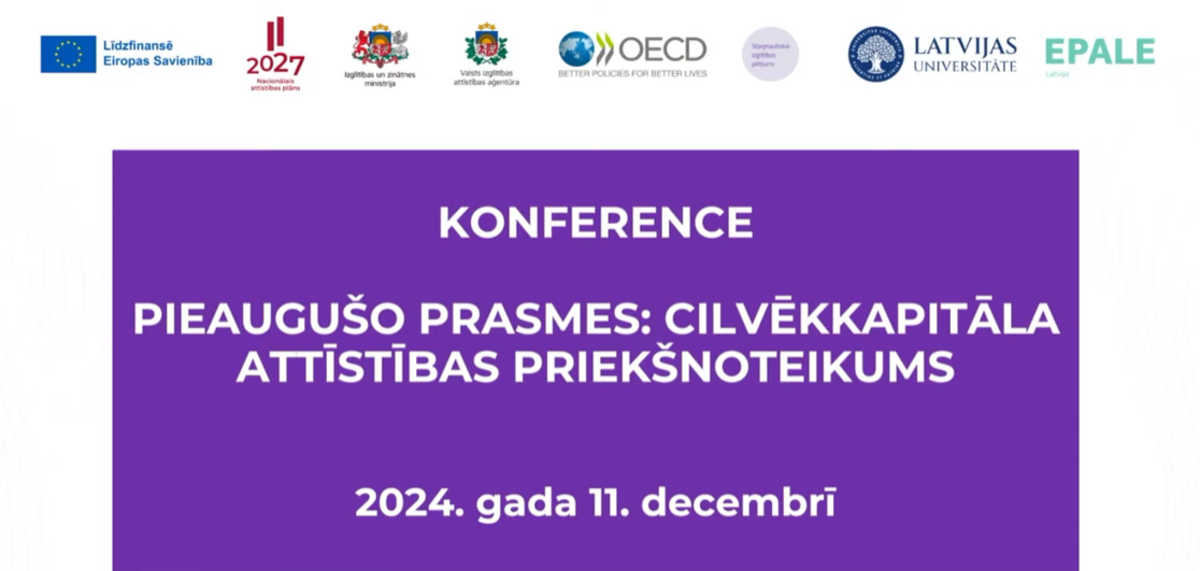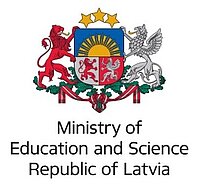
Professor and leading researcher Inese Lūsēna-Ezera from the RTU Liepaja Academy, representing the State Research Programme "Education" (SRP "Education") project "Elaboration of evidence-based solutions for effective professional competence development of adults and assessment of the transfer of its results into practice in Latvia" (project No. VPP-IZM-Izglītība-2023/4-0001), participated in a conference organised by the Latvia’s Ministry of Education and Science on 11 December 2024. The conference, entitled "Adult Skills: A Prerequisite for Human Capital Development", focused on presenting the results of Programme for the International Assessment of Adult Competencies (PIAAC) conducted by the Organisation for Economic Cooperation and Development (OECD).
The conference marked the first publication of Latvia's results in the PIAAC study. From 2022 to 2023, 31 countries assessed three key skills among adults aged 16 to 65: literacy (the ability to engage with, comprehend, and analyse written texts broadly), numeracy (the ability to work with numbers and mathematical concepts), and adaptive problem-solving (the ability to identify cause-and-effect relationships and solve novel problems).
Latvia’s participation in the study involved 6,563 adults. The results revealed that Latvia’s adults scored an average of 248 points in literacy (OECD average: 260), 263 points in numeracy (matching the OECD average), and 244 points in adaptive problem-solving (OECD average: 251). The findings also highlighted correlations between adult skills and socioeconomic indicators in Latvia. For instance, individuals achieving the highest proficiency level in numeracy had significantly better employment prospects compared to those scoring at or below level 1. Similarly, higher proficiency in skills correlated with greater personal well-being, with individuals at the top skill level reporting higher life satisfaction and better health than those at or below level 1.
During the conference, Elif Bahar, a labour market economist at the Skills and Future Readiness Division of the Directorate for Employment, Labour and Social Affairs at the OECD, and Aija Zobena, the Latvia’s PIAAC project leader and professor at the University of Latvia, presented the Latvia’s results. Professor Gundars Bērziņš from the University of Latvia emphasised the importance of the findings for Latvia’s human capital and productivity development. A panel discussion on strategic challenges and systemic solutions for Latvia’s human capital featured Minister for Education and Science Anda Čakša, Minister for Finance Arvils Ašeradens, Minister for Economics Viktors Valainis, and Parliamentary Secretary for the Ministry of Welfare Reinis Uzulnieks.
Professor Johnny Sung, Honorary Fellow in Skills, Knowledge, and Organisational Performance at the University of Oxford and an expert on Individual Learning Accounts, introduced the conference participants to the ecosystem and key steps in implementing individual learning accounts. Additionally, Signe Briķe, Head of the Recovery Fund Project Implementation Department at the Ministry of Education and Science, presented the unified digital portal, www.spars.gov.lv, as a significant platform for managing adult skills and establishing a cohesive and sustainable adult education system in Latvia.
The insights gained from the conference will be highly valuable for the SRP "Education" project, particularly in evaluating the current state of adult professional competence development and planning the next phase of the SRP "Education" project - elaborating a framework for effective professional competence development for adults at both organisational and systems levels, tailored to the Latvia’s context.



 CONFERENCE
CONFERENCE